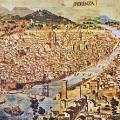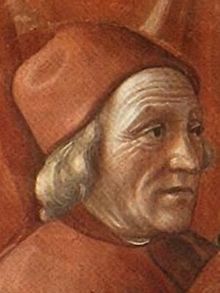340. Footnotes to Plato: Marsilio Ficino
Marsilio Ficino’s revival of Platonism, with a focus on his proofs for the soul’s immortality in his magnum opus, the Platonic Theology.
Themes:
• M.J.B. Allen (trans.) and J. Hankins (ed.), Marsilio Ficino: Platonic Theology, 6 vols (Cambridge MA: 2001-2006).
---
• M.J.B. Allen, The Platonism of Marsilio Ficino: a Study of his Phaedrus Commentary, its Sources and Genesis (Berkeley: 1984).
• M.J.B. Allen, Plato’s Third Eye: Studies in Marsilio Ficino’s Metaphysics and its Sources (Aldershot: 1995).
• M.J.B. Allen, Studies in the Neoplatonism of Marsilio Ficino and Giovanni Pico (Abington: 2017).
• M.J.B. Allen and V. Rees (eds), Marsilio Ficino: His Theology, His Philosophy, His Legacy (Leiden: 2002).
• K. Eisenbichler and O.Z. Pugliese (eds), Ficino and Renaissance Neoplatonism (Ottawa: 1986).
• G.C. Garfagnini (ed.), Marsilio Ficino e il ritorno di Platone: studi e documenti, 2 vols (Florence: 1986).
• J. Hankins, “Ficino on Reminiscentia and the Transmigration of Souls,” Rinascimento, 2nd series, 45 (2005), 3-17.
• S. Howlett, Ficino and his World (New York: 2016).
• P.O. Kristeller, The Philosophy of Marsilio Ficino, trans. V. Conant (Gloucester MA: 1964).







Comments
Hi Peter,
Hi Peter,
Will we have an episode on Nicholas of Cusa?
In reply to Hi Peter, by mehmet
Nicholas of Cusa
Yes and in fact I think I promised one in this series, back in the introduction (328), but now I am actually thinking I will hold off and include him when covering the Reformation/Northern Renaissance. He could go in either place but I think he may illuminate the German context more than the Italian one. So I'm afraid it'll be a while.
Harold/Heresy
Finally he returns, if only by mention (18:55). I have been increasingly concerned that our good Doctor had bumped off Hiawatha's cousin and relegated Harold to the same realm as Peter's sister.
And--
What was Ficino thinking with his list of the six great sages, all being pagans or pagan gods?--unquestionable Heresy whether Christian or pagan.
In reply to Harold/Heresy by Otter Bob
Heresy
Yes, very good question. We have an interview coming up with Denis Robichaud which talks at length about Ficino's use of pagan material and how he saw its relationship to Christianity, so stay tuned!
Aglaophemus?
Hi Peter, I too was struck by at least one of Ficino's Perennial Wisdom sages, and perhaps Denis Robichaud can shed light on that Aglaophemus guy...I have no idea where he came up with that name or what tradition he's pulling it from. Interesting choice! On another note, I've finally caught up on this entire series (yay!) and am well into HIP and will proceed to HAP subsequently. When HAP is complete, will you be moving on to Chinese philosophy? I really would love to learn more about these other schools of thought, especially Confucianism/Ruism, and I really enjoy your long deep dives into all of these philosophic worlds you've covered thus far, so I hope this is in the works down the line. Cheers!
In reply to Aglaophemus? by Christopher Strong
Aglaophemus
Thanks very much! I will indeed be doing chinese philosophy after Africana, together with co-author Karyn Lai. We have already started thinking about what to cover etc.
Aglaophemus by the way is not someone Ficino just made up and I kind of knew the name despite my little joke there; he is given as a link between Orpheus and Pythagoras and was supposedly the person who initiated the latter into the tradition.
In reply to Aglaophemus by Peter Adamson
Aglaophemus
Right, Ficino's sources for this mysterious figure are Iamblichus and Proclus.
Add new comment